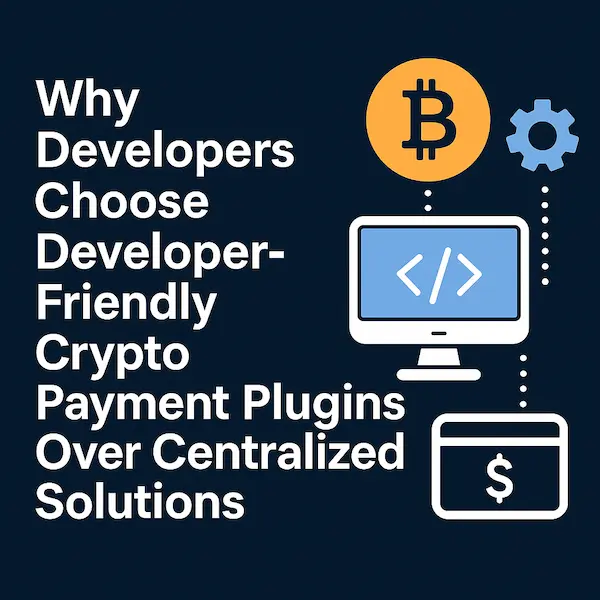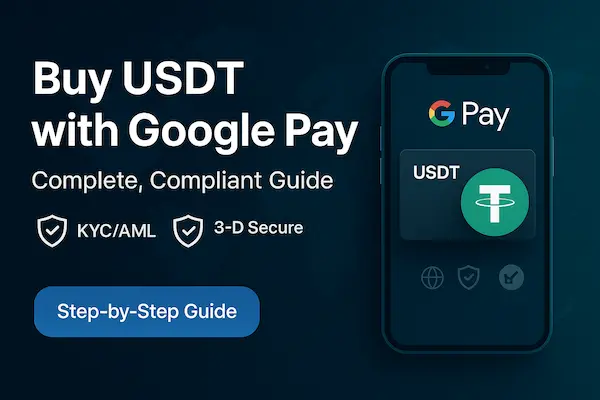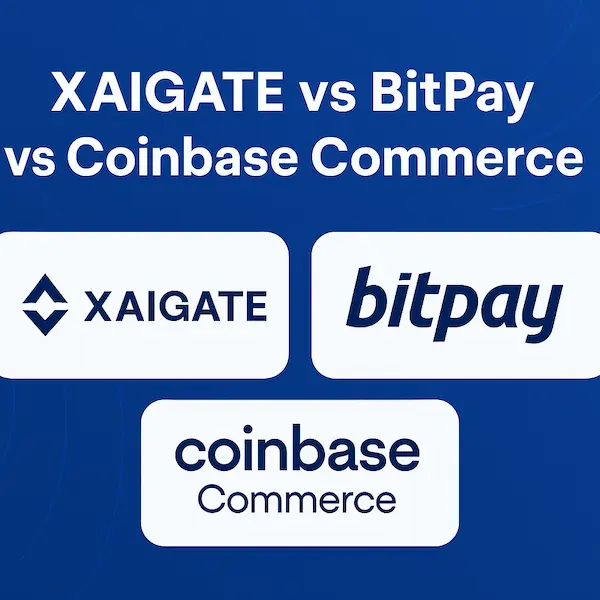In the rapidly evolving world of digital payments, developers are increasingly opting for open source, developer-friendly crypto payment plugins over traditional centralized payment gateways. This shift isn’t just a trend—it’s a response to real-world demands for transparency, flexibility, and full control over transaction infrastructure. In this article, we will explore why open source payment systems are gaining traction, how they empower developers, and what makes them the preferred choice in 2025 and beyond.
Contents
- 1 What Is a Developer-Friendly Crypto Payment Plugin?
- 2 Centralized Crypto Payment Gateways: Limitations Developers Face
- 3 Why Open Source Crypto Plugins Are a Better Fit for Developers
- 4 Case Study: How Developers Build Scalable Crypto Checkout Systems with XAIGATE
- 5 Developer Considerations When Choosing an Open Source Plugin
- 6 Open Source vs. Centralized: Feature Comparison Table
- 7 How to Get Started With a Developer-Friendly Plugin
- 8 FAQs: Developer-Friendly Crypto Payment Gateways Explained
- 9 Final Thoughts
What Is a Developer-Friendly Crypto Payment Plugin?
A developer-friendly crypto payment plugin is a software tool designed to integrate cryptocurrency payments into websites, apps, or eCommerce platforms with minimal friction and maximum customization. These plugins often come with:
- Open source licenses
- Publicly accessible and modifiable code
- API and SDK documentation
- Active developer communities
Unlike closed, proprietary systems, these plugins allow developers to customize, audit, and deploy payment infrastructure according to their unique needs—without being locked into a vendor’s ecosystem.
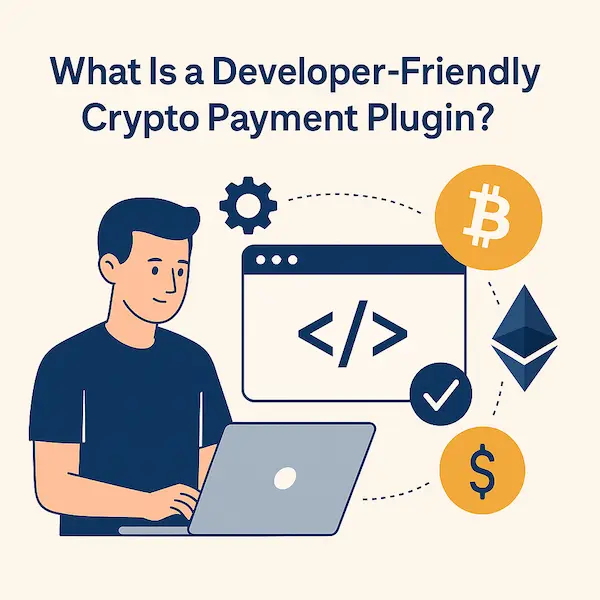
Centralized Crypto Payment Gateways: Limitations Developers Face
While centralized gateways like XaiGate provide plug-and-play convenience, they come with trade-offs that developers often find limiting:
- Limited Customization: Developers can’t modify core functionality or adapt the platform to unique business models.
- Vendor Lock-In: Switching providers may require re-integration from scratch.
- High Fees: Many platforms charge transaction fees between 0.5% and 2%.
- KYC/AML Enforcement: Strict compliance requirements can exclude users or restrict access.
- Lack of Transparency: Code is not open for audit, creating potential security and trust issues.
These limitations are especially problematic for developers building decentralized apps (dApps), privacy-first platforms, or businesses in jurisdictions with unique legal frameworks.
Why Open Source Crypto Plugins Are a Better Fit for Developers
1. Full Code Access and Customization
Developer-friendly crypto payment plugins like XaiGate offer full source code access. This empowers developers to:
- Modify payment logic
- Integrate directly with smart contracts
- Tailor user interfaces
- Add new blockchain support
This flexibility is essential for projects that don’t fit into the one-size-fits-all mold of centralized systems.
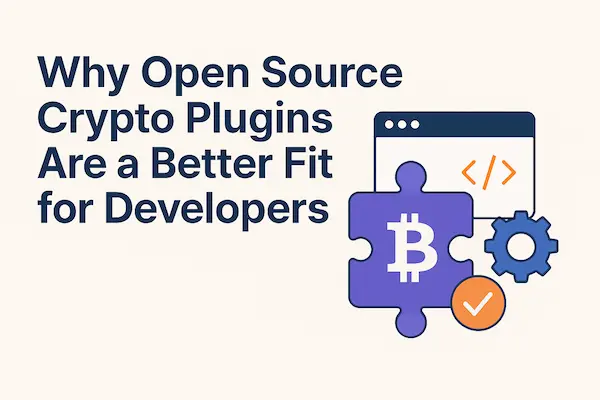
2. Transparent Security
Security is a top concern in crypto. Open source systems are peer-reviewed and constantly updated by the community. Bugs, vulnerabilities, and attack vectors are quickly spotted and patched—an advantage proprietary software rarely matches.
Popular open source plugins often have public GitHub repositories, issue trackers, and security audit trails. Developers can assess the code quality and community trust themselves.
3. No Vendor Lock-In
Once you deploy a centralized payment plugin, you’re bound by that provider’s uptime, support policies, and pricing structure. Open source systems offer self-hosting capabilities—you control the infrastructure.
This means:
- No surprise policy changes
- Total control over upgrades and deployment
- Long-term independence from third-party risks
4. Lower Operating Costs
Most developer-friendly crypto payment plugins do not charge transaction fees. BTCPay Server, for example, charges 0% fees and only requires the merchant to pay standard blockchain gas costs.
For high-volume businesses, this can translate to thousands of dollars saved annually compared to centralized gateways.
5. Support for Privacy and No-KYC Models
Many developers are building solutions for users who prefer pseudonymous or anonymous interactions. Centralized gateways usually require KYC, which can:
- Limit global reach
- Alienate privacy-conscious users
- Conflict with local privacy laws
Open source systems, being self-hosted and KYC-optional, enable developers to create crypto experiences aligned with their users’ expectations.
6. Easier Integration with Custom Tech Stacks
Proprietary plugins may only support specific platforms. Developer-friendly plugins often expose REST APIs, WebSocket endpoints, or SDKs that allow seamless integration with:
- Custom front-end frameworks (React, Vue)
- Backend servers (Node.js, Python, Go)
- Blockchain layers and smart contracts
This makes them ideal for building scalable crypto-native platforms.
Case Study: How Developers Build Scalable Crypto Checkout Systems with XAIGATE
At XAIGATE, developers across various industries are leveraging our open source crypto payment gateway plugin to build secure, no-KYC, and fully customizable checkout systems—tailored to both Web2 and Web3 environments.
One example comes from a global freelance marketplace that needed a self-hosted, developer-friendly crypto payment plugin to support cross-border payments in USDT, ETH, and SOL. Using XAIGATE’s open SDK and RESTful API, their development team was able to:
- Integrate the plugin directly into their React-based frontend
- Automate wallet address generation and order confirmation callbacks
- Implement multi-chain support with fallback logic for network congestion
- Avoid third-party lock-in while maintaining full custody over funds
Another use case involved an NFT game studio needing real-time crypto payment processing with low latency and no KYC interruptions. XAIGATE’s plugin was embedded into their backend in under a week, with custom logic to route payments through Solana for speed and cost-efficiency.
In both scenarios, developers chose XAIGATE not only for its transparency and open source design, but because it let them own the full payment stack—from front-end UX to final wallet reconciliation.
Developer Considerations When Choosing an Open Source Plugin
Before deploying any crypto payment plugin, developers should assess:
- Code Quality: Is the codebase modular, well-documented, and actively maintained?
- Community: Is there a large and engaged developer ecosystem?
- Security Practices: Are there recent audits or issue patches?
- Licensing: Does the license (MIT, GPL) allow commercial modification and redistribution?
- Integration Stack: Are the APIs flexible and well-documented for your language/framework?
Open Source vs. Centralized: Feature Comparison Table
| Feature | Open Source Plugin | Centralized Gateway |
|---|---|---|
| Customization | High | Low |
| Transaction Fees | 0% | 0.5% – 2% |
| KYC Requirements | Optional | Mandatory |
| Transparency | Full (open code) | Limited |
| Hosting | Self-hosted | Cloud-only |
| Developer Ecosystem | Active, public forums | Closed, support tickets |
| Blockchain Support | Customizable | Pre-defined |
| Risk of Account Suspension | None | Possible |
How to Get Started With a Developer-Friendly Plugin
- Choose your plugin (Like XAIGATE)
- Read the documentation and decide your hosting environment
- Install via Docker or manual setup
- Test payments on testnet before going live
- Integrate with your frontend/backend stack
- Secure your infrastructure (HTTPS, wallet security, backups)
Choosing the right open source crypto payment gateway plugin can help online stores reduce fees, avoid KYC requirements, and retain full control over the checkout process.

FAQs: Developer-Friendly Crypto Payment Gateways Explained
1. What makes a crypto payment plugin developer-friendly?
A developer-friendly crypto payment plugin provides open access to source code, extensive API documentation, modular architecture, and flexibility for customization. It allows developers to self-host, integrate with any tech stack, and modify payment logic based on specific business needs.
2. Why do developers prefer open source crypto payment gateways?
Open source crypto gateways offer full transparency, no vendor lock-in, zero transaction fees (in most cases), and complete control over integration and security. Developers value these attributes because they align with principles of decentralization and system ownership.
3. Is a developer-friendly crypto payment plugin suitable for enterprise projects?
Yes. Many enterprise-grade projects rely on developer-friendly plugins because of their scalability, adaptability, and cost efficiency. Open source plugins are also ideal for businesses that need to comply with specific regulatory or technical requirements.
4. Do developer-friendly plugins require advanced technical skills?
While some plugins can be integrated with basic setup guides, most developer-friendly crypto payment solutions do require working knowledge of APIs, webhooks, hosting environments (e.g., Docker, Linux), and blockchain logic. That’s why they are favored by technical teams.
5. Can developer-friendly crypto payment plugins work without KYC?
Yes. Most open source crypto plugins are self-hosted and don’t require user identity verification by default. This makes them ideal for privacy-first platforms and global businesses operating in no-KYC environments.
6. How secure are open source crypto payment plugins?
Security depends on how the plugin is implemented and maintained. Developer-friendly plugins often benefit from community-led code audits, transparency, and peer review. When properly configured, they are as secure—or even more secure—than closed systems.
7. Can I integrate a developer-friendly crypto plugin into WooCommerce or Magento?
Absolutely. Many developer-oriented crypto plugins include pre-built modules for WooCommerce, Magento, or offer well-documented APIs to build your own integration. This gives developers maximum control over eCommerce payments.
Final Thoughts
In 2025, developer-friendly crypto payment plugins are not just an alternative—they’re a competitive edge. Open source solutions empower developers to build secure, scalable, and future-proof crypto experiences without the constraints of centralized systems.
For any developer looking to build trustless, global, and low-cost payment systems, open source plugins are the smartest starting point. With the right setup, you’re not just accepting crypto—you’re embracing the true ethos of decentralization.
We may also be found on GitHub, and X (@mxaigate)! Follow us!
Don’t miss out on the opportunity to elevate your business with XAIGATE’s Open Source Crypto Payment Gateway Plugin . The three-step process is designed to be user-friendly, making it accessible for all busineses. Embrace this modern payment solution to provide customers with a secure and efficient way to pay. Take the first step towards a competitive edge in the digital realm and unlock the benefits of cryptocurrency payments for online casino today.

